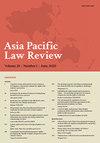Mediation in contemporary Chinese civil justice: a proceduralist diachronic perspective
IF 1.7
4区 社会学
Q2 LAW
引用次数: 0
Abstract
cross, even more than four decades after the onset of Reform and Opening. What will be the result of the Party’s conservative turn on human rights and the rule of law? As Fu Hualing points out, some activists may be radicalized as they witness intensifying state repression. For those lawyers, intensifying repression must be met with a more overtly political response, including increasingly public and overt efforts to call attention to rights abuses, and to link those abuses to the very structure and nature of the Party-state itself. Eva Pils makes a similar point in her chapter on human rights and the political system, arguing that many activists are shedding their incrementalist approach in favour of a more overtly political stance, one that does not shy away from direct criticism of the Party-state. For other activists, the response to increasing authoritarianism may not be radicalization, but rather alienation and disengagement. The past several years have seen a growing number of activists from China – and now from Hong Kong – choosing exit over voice, and seeking to build new lives in the United States, Europe, and elsewhere. The Party may well see such alienation as in line with its own interests. But it is also possible that the Party’s increasing rigidity, and the cynicism it feeds, could in fact erode public support for the regime, thus undermining rather than enhancing its long-term prospects for survival. How does this story end? No doubt, the struggle for human rights in China is a long-term one, and activists have largely accommodated themselves to the reality that they must take the long view. There are few if any signals that the regime will shift its hard-line approach anytime soon, and few potential external shocks – save for a severe economic crisis, or a messy conflict over Taiwan or the South China Sea – that could force the Party’s hand. Still, it would be a mistake to underestimate the ability of Chinese activists and lawyers to not only survive these latest challenges but perhaps even to come up with adaptive responses to state repression. It is possible that, in the years to come, many activists will develop innovative approaches that allow them to continue to press the Communist Party leadership to better respect the rights of its own citizens. After all, as this volume ably documents, Chinese rights activists have already accomplished more than many outside observers would have thought possible. As the next chapter in the struggle for human rights in China is written, these same activists, perhaps joined by growing numbers of a disillusioned public, will play a leading role.当代中国民事司法中的调解:程序主义历时性视角
跨越,甚至在改革开放四十多年后的今天。中国共产党在人权和法治问题上的保守转向会带来什么结果?正如傅华玲所指出的那样,一些活动人士可能会在目睹政府日益加剧的镇压后变得激进。对这些律师来说,加强镇压必须得到更公开的政治回应,包括越来越多的公开努力,呼吁人们关注人权侵犯,并将这些侵犯与党国本身的结构和性质联系起来。伊娃·皮尔斯(Eva Pils)在她关于人权和政治制度的章节中提出了类似的观点,她认为许多活动人士正在放弃他们的渐进主义方法,转而采取更公开的政治立场,不回避对党国的直接批评。对其他活动人士来说,对日益增长的威权主义的反应可能不是激进化,而是疏离和脱离。在过去的几年里,越来越多来自中国大陆的活动人士——现在来自香港——选择退出而不是发声,并寻求在美国、欧洲和其他地方建立新的生活。党很可能认为这种异化符合自己的利益。但也有可能的是,共产党日益增长的僵化,以及由此滋生的犬儒主义,实际上可能会侵蚀公众对政权的支持,从而削弱而不是增强其长期生存的前景。这个故事是怎么结束的?毫无疑问,中国的人权斗争是一场长期的斗争,活动人士基本上已经适应了他们必须着眼长远的现实。几乎没有任何迹象表明这个政权会在短期内改变其强硬路线,也几乎没有潜在的外部冲击——除了严重的经济危机,或者台湾或南中国海的混乱冲突——可能迫使中共采取行动。然而,低估中国维权人士和律师的能力将是一个错误,他们不仅能够应对这些最新的挑战,甚至可能对政府的镇压提出适应性的回应。在未来的几年里,许多活动人士可能会发展出创新的方法,使他们能够继续向共产党领导层施压,要求他们更好地尊重本国公民的权利。毕竟,正如本书巧妙地记录的那样,中国维权人士所取得的成就已经超出了许多外部观察家的想象。随着中国人权斗争的下一个篇章的书写,这些活动人士,或许还有越来越多的失望的公众,将发挥主导作用。
本文章由计算机程序翻译,如有差异,请以英文原文为准。
求助全文
约1分钟内获得全文
求助全文

 求助内容:
求助内容: 应助结果提醒方式:
应助结果提醒方式:


